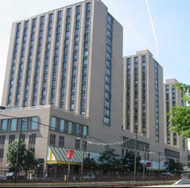New Guest Policy Means More Power, More Responsibility
Students say they’re ready for change

Students responded to the proposed new guest policy with enthusiasm and relief yesterday, expressing confidence in their ability to handle the responsibilities that would come with the proposal’s new freedoms.
“It’s about time — I just wish it had come sooner,” said Emeri Burks (CAS’08), who lives at 575 Commonwealth Ave. “I think the administration should trust us enough to make our own decisions.”
The proposed new policy, which Dean of Students Kenneth Elmore announced to the Student Union on Wednesday night, would eliminate several restrictions on access to BU’s residence halls and would place greater emphasis on student responsibility and communication between roommates. Under the proposed new guidelines, students currently living in a campus residence would use their BU ID to swipe into any residence hall between the hours of 7 a.m. and 2 a.m., and students would be able to sign in guests with photo identification at any time, day or night. To obtain an extended visitor’s pass, a student would need to obtain verbal or written permission from his or her roommate.
The rule about finding a co-host to sign in visitors of the opposite sex would no longer be in effect.
“I think the policy is both good and bad,” said Adrienne Golden (SED’09), the secretary of the residence hall association at 575 Commonwealth Ave. “One of the great things will be the ability to sign into another dorm up until 2 a.m., but I think roommate conflicts will definitely come to the forefront.”
The proposal is a marked departure from the current policy, which does not allow campus residents swipe access to other residence halls past 8 p.m. and requires students to apply to their residence hall director 24 hours in advance for a three-day guest pass. Students have been petitioning the administration and the Student Union to change the current policy for years, arguing that it restricts their ability to hold late-night study sessions or to have friends and family members visit campus.
“The guest policy is one of the reasons I moved off campus,” said Lauren Richler (SAR’07). “I’m from Boston, and I wouldn’t be able to have friends over because they’d call to tell me they were in town that same night.”
Elmore said on Wednesday that the proposal had been developed throughout months of meetings with students, administrators, and the Faculty Council. It is intended to give students both greater freedom in their experience in the residence halls and greater responsibility for the conduct of their guests.
“This is about responsibility, communication, and maturity,” said Elmore. “We are clearly saying, ‘We trust you not to compromise other people’s safety.’”
Students interviewed yesterday said that they understood the need for added security on an urban campus, but believed that the proposed new policy, which requires visitors to leave a photo ID at the building’s residential safety desk, will be more than adequate. “You still know who’s in the building, because you have to leave your ID,” said Abigail Terry (COM’08), who lives at 10 Buick St.
The new policy outlines slightly different procedures for large residence halls, 10 Buick St., and the South Campus and Bay State Road residences, and does not allow students living off-campus swipe access at any time — a provision that some students find shortsighted. “I think the new guest policy sounds great — if you don’t live off-campus,” said Shyang Puri (CFA’10), who lives in Brookline. “I just worry students living off-campus will still be treated like second-class citizens.”
The proposed new policy is now available for review online at the Dean of Students’ Web site, where visitors can submit questions and comments about the new procedures. The University Council, comprising faculty and staff, will vote on whether to implement the policy on April 18, and if voted in, the revised policy will be sent to University President Robert Brown for approval. The new policy would take effect in September 2007.
Although the proposal’s status will not be determined for several weeks, some students said it could influence their housing choices for next year, and all felt that it was a step forward for the University’s administration.
“Finally, they’re treating us like adults,” said Rose Aplustill (CAS’09). “We are adults — we’re in college.”
Catherine Santore and Vicky Waltz contributed to this article.
Jessica Ullian can be reached at jullian@bu.edu.